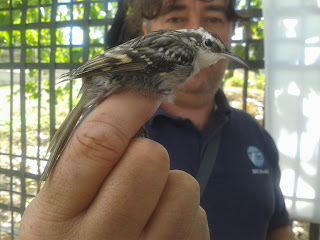Cetti's warbler (Cettia cetti) ready to be released.
Hi friends!
Autumn has officially started and bird ringing becomes one of the most important activities related to the bird's world (scientificly speaking).
We´ve all seen or have been to bird ringings in the countryside, but bird ringing in the heart of the city is always a great experience. It reminds us that cities are sited in the countryside, and that there are lots of living creatures out there sharing such spaces with us other than the most evident ones that we all know.
Here in beautiful Zaragoza we are lucky to have one of the biggest parks in Spain, a park that combines dry areas with forest ones and the Huerva river, an affluent of the mighty Ebro, as the heart of it.
Such conditions make this park quite special when talking about fauna and flora for it is a natural getaway from the city both through the river and the outer limits of the park itself which are outside the urban area and connect straight to the countryside, allowing "visitors" to enter and leave the park without any barrier.
On sunday the 29th of september, I went with my friend Eduardo to a bird ringing session organized by the SEO/Birdlife Organization.
The expectations weren't very great forthe annual Marathon was taking place and it's start was the park (known as José Antonio Labordeta's Park or simply "The Great Park") itself.
But, as always, nature offered us a great morrning.
SEO/Birdlife 's friendly staff ringing birds and answering every question the attendants asked.
First we had a nice walk through the park, watching and identifying bird species, and after the walk, we attended the ringing point where SEO/Birdlife's staff were ringing and obtaining info from the net captured birds.
Great tit (Parus major) ringing.
Same guy ready for freedom!!
Basically, this is what is need to be done: A special net is set to capture the different species of birds. The birds are put into special fabric bags individually in order to reduce stress. Then the birds are ringed, weighed, measured and checked one by one.
Bird ringing is very important for it provides us with vital information about the specimen itself, tellling us where it has been captured before, its age and sex, its health or the time of the year when it is living in the capturing zone, and about the species in general (frecuency of captures of the same species, health,...).
All the results are communicated to other bird studying oganizations in order to have a global knowledge of the matter.
Young female Eurasian Blackcap (Sylvia atricapilla) being ringed.
Checking the muscular fat and general muscle proportion of the same specimen.
Ready to go!!
Let me tell you how to check the muscular proportion and intramuscular fat of a bird: you blow a little air in order to remove some of the feathers from the chest and belly of the bird and compare what you have seen with an index with basic drawings. This information will tell you about the general state of the bird: if it is well fed, ready to emigrate, just arrived, ill,...
Measuring, weighing and releasing of an European Pied Flycatcher (Ficedula hypoleuca).
The ringing was focused in small birds, with different species being ringed and released (plus a Short-Toed Treecreeper - Certhia brachydactyla - previously ringed from which we obtained data), being young Eurasian Blackcaps (Sylvia atricapilla) the most frequent, followed by European Pied Flycatcher (Ficedula hypoleuca).
Young Eurasian Blackcap (Sylvia atricapilla) males.
Very important!!: these kind of actions, though very important and necessary to zoology, provide the birds a certain amount of stress which differs from one species to another and from individuals of the same species too, so, try to be as brief and quick as you can be whenever manipulating a bird and, if you can, check the most easyly stressed ones first in order to release them as soon as possible.
Checking and ringing a Short-Toed Treecreeper(Certhia brachydactyla).
This species are easyly stressed, so the ringer must be specially quick and calm to get all the info and release the bird.
Ask your local bird studying organization about ringing activities and don't hesitate to book yourself in one of them.
There's a lot to see, a lot to do and a lot to learn!!
Thanks SEO/Birdlife!!















